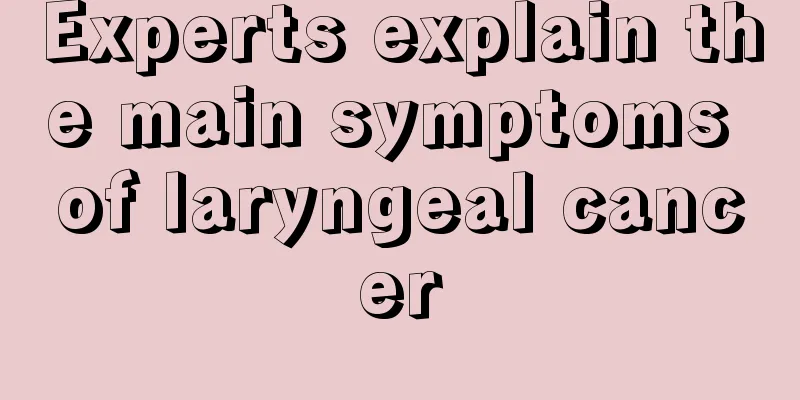What to do if you have nasopharyngeal cancer

|
What should you do if you have nasopharyngeal cancer? Nasopharyngeal cancer is a malignant tumor with a relatively high incidence rate, which is very harmful to humans. With the continuous development and progress of medical technology, the treatment of nasopharyngeal cancer has achieved certain results. So, what should you do if you have nasopharyngeal cancer? The following is a detailed introduction for you. 1. Radiotherapy: Most nasopharyngeal carcinomas are moderately sensitive to radiotherapy, and radiotherapy is the first choice for nasopharyngeal carcinoma. However, for highly differentiated cancers, advanced disease course, and recurrence after radiotherapy, surgical resection and chemotherapy are also indispensable means. 2. Chemotherapy: mainly used for mid- and late-stage cases. It is an auxiliary or palliative treatment for patients who cannot be controlled or relapse after radiotherapy. There are three common ways of administration: (1) Systemic chemotherapy: It can be taken orally, injected intramuscularly, or intravenously. Commonly used drugs include nitrogen mustard, cyclophosphamide, 5-fluorouracil, bleomycin, thiotepa, etc. One drug can be used alone or in combination. (2) Half-body chemotherapy: It is a therapy that compresses the abdominal aorta, temporarily blocks the blood circulation in the lower body, and rapidly injects nitrogen mustard into the veins of the upper limbs. The nitrogen mustard takes effect 2 to 3 minutes after injection into the body, and the drug potency is reduced by half after 15 minutes. This can both increase the drug concentration in the upper body and protect the bone marrow hematopoietic function in the lower body. (3) Arterial catheterization chemotherapy: It can increase the drug concentration in the nasopharynx and reduce systemic side effects. Anticancer drugs are injected through retrograde catheterization of the superficial temporal artery or facial artery. It has a certain short-term efficacy for early (stage I and II) cases with single small upper deep cervical lymph node metastasis, late-stage cases with cranial nerve involvement, or local residual or recurrent cases in the nasopharynx after radiotherapy. 3. Surgery: It is not the main treatment method and is only performed in a few cases. Its indications are: patients with localized lesions in the nasopharynx that do not disappear or recur after radiotherapy. For patients with metastatic lymph nodes in the neck that do not disappear after radiotherapy and present as active solitary masses, and patients whose primary lesions in the nasopharynx have been controlled, neck lymph node dissection can be performed. Nasopharyngeal carcinoma is mainly treated with radiotherapy, and residual lesions can be surgically removed. The irradiation range includes the nasopharynx, skull base, neck and orbit. The dose for the primary lesion is 65-70 Gy, and the dose for the secondary lesion is 50-60 Gy. Because the tumor is prone to recurrence and early metastasis, the prognosis is poor. The 5-year survival rate of squamous cell carcinoma that is insensitive to radiation is 0%-10%, and the 5-year survival rate of radiosensitive lymphoepithelioma is about 30%. |
<<: Is small cell lung cancer related to genetics?
>>: What are the precautions for breast cancer chemotherapy
Recommend
Eight rumors about tea and food incompatibility, are they really like this?
As the saying goes, "after meals", &quo...
How to treat supraventricular tachycardia, four methods can help you
Supraventricular tachycardia is a common disease ...
Can wax apple be eaten directly?
Wax apple is a very common fruit in daily life. I...
Is hair loss due to kidney yang deficiency or yin deficiency
Every autumn, many people find that they are losi...
Skin cancer prevention measures for pregnant women
Nowadays, people in our society are almost afraid...
What toxins appear after cupping the thighs?
In recent years, with the enhancement of people&#...
The more common symptoms of pancreatic cancer include unexplained jaundice
The more common symptoms of pancreatic cancer inc...
What should patients with advanced liver cancer do when they are in pain? What are the treatments for advanced liver cancer?
Liver cancer is a highly malignant tumor, which i...
Is it possible that late-stage kidney cancer is contagious?
Is it possible for advanced kidney cancer to be c...
Outdoor hiking equipment
Nowadays, people know how to enjoy life, see the ...
What are the dangers of melanoma
In daily life, many people don't know much ab...
How to protect oral mucosa, three 'great gods' come to give you tips
To prevent oral diseases, it is very important to...
Are there any sequelae of radiotherapy for nasopharyngeal carcinoma? What should I pay attention to?
Are there any side effects of radiotherapy for na...
What's the use of expired lipstick
Lipstick should be a must-have cosmetic item in e...
Can pinching the bridge of the nose make it taller?
For female friends who love beauty, you all want ...









